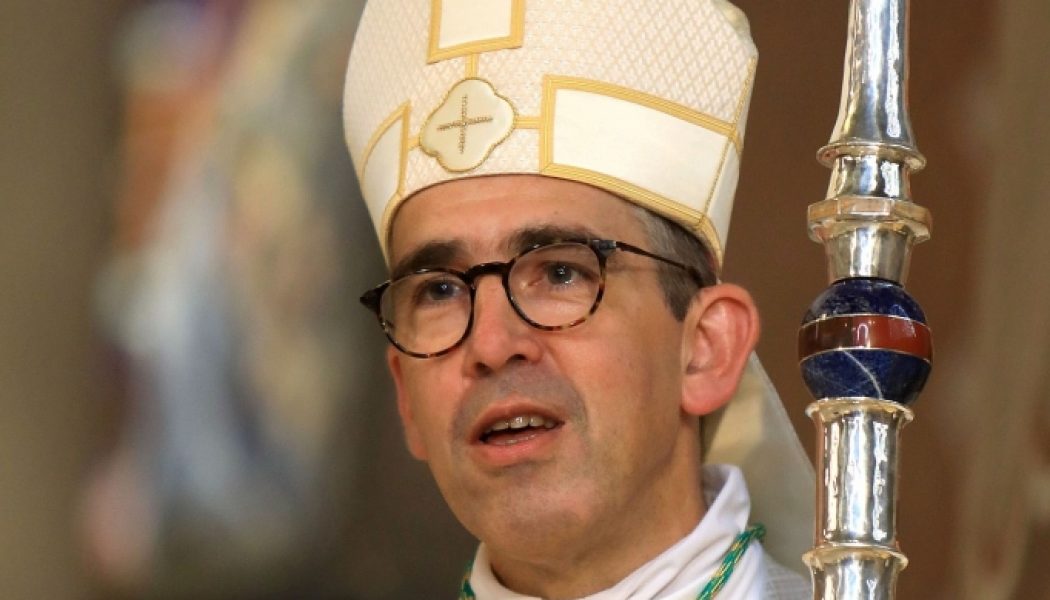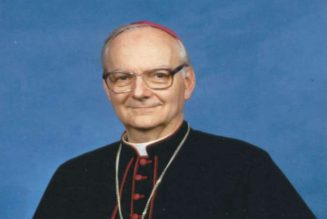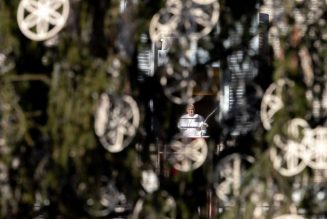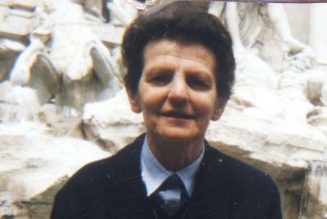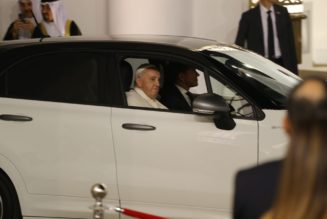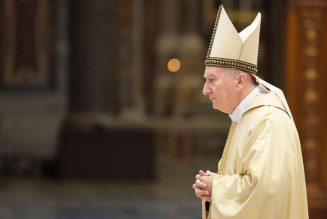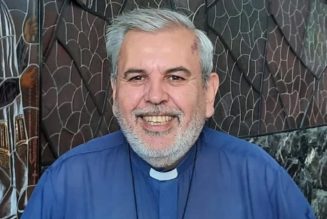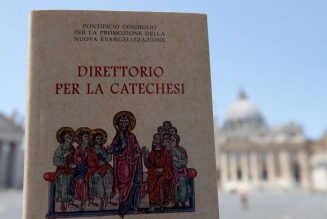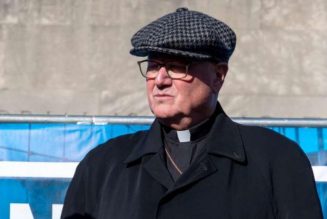
The French bishops have ‘presented a very rigorous plan’ to the government regarding reopening churches, according to Bishop Matthieu Rougé of the Diocese of Nanterre. (‘AntonyB,’ CC BY-SA 4.0, via Wikimedia Commons)
The French government has decided to maintain suspension of public Masses during Phase 2 of the pandemic, despite an intense outcry from the clergy and the faithful.
PARIS — As France is preparing to initiate “Phase 2” of the coronavirus emergency, starting May 11, the Catholic faithful already know that the life of faith won’t become whole again for at least another several weeks: Indeed, public celebration of Mass is not part of the list of activities permitted during this phase, as announced by Prime Minister Edouard Philippe in his much-awaited April 28 address to the French Parliament.
Before the announcement, Catholics around the nation voiced their concerns with reasoned yet passionate pleas for the government to reconsider their prohibitions against the Church at this time. Once the announcement was made, however, the decision to exclude the Church’s concerns aroused a general outcry at every level of the Catholic world in France, starting with the Church authorities themselves, who saw in the government’s attitude a mark of contempt. Indeed, reactions of indignation have succeeded one another in the whole episcopacy since then.
Catholics Speak Up
Before the French government’s announcement for Phase 2, which excluded considerations of public worship, the Bishops’ Conference of France had anticipated the government’s decision by presenting, a few days before the easing to the lockdown was announced, a very detailed safety plan for Catholic churches during this process, to prevent the spread of the virus.
In addition, an opinion column signed by a group of 130 priests was published three days before the government announcement. The April 25 column encouraged President Emmanuel Macron to authorize the Church to resume public celebration of Mass on May 11.
“We ask no more, but no less than others,” the priests wrote. “We are not asking for a total resumption of our celebrations without any discernment or prudence, but we’re asking to be trusted to set up and live a progressive ease of lockdown, following stages, while totally respecting the sanitary rules.”
One day earlier, through a video published on social media, a group of young Catholics had likewise challenged the French president to ease restrictions for Catholic worship.
However, all of these initiatives remained a dead letter, as Philippe announced, in his April 28 address to the Parliament, that religious celebrations wouldn’t resume before June 2.
Disrespect Toward Believers
The news came as a heavy blow to the faithful, who were already deprived of Easter celebrations and could also miss the celebration of the Ascension and Pentecost if this decision remains in effect.
“It is just like if we were a bunch of kids who can’t put something together,” Archbishop of Paris Michel Aupetit said in an April 29 interview, expressing his “extreme disappointment” with the government, which initially committed itself to lift the suspension of Masses by May 16. “Something was not respected here,” he said.
Contacted by the Register, Bishop Matthieu Rougé of the Diocese of Nanterre (Hauts-de-Seine) said that the most striking and saddening aspect of the controversy is that Philippe announced that liturgical resumption would be allowed three weeks after the reopening of many other activities in the country — and that he did so without ever having explicitly responded to the bishops’ proposed plan for Phase 2.
“The Catholic Church in France wants a responsible ecclesial ease of lockdown, at the pace of the rest of the society, and we presented a very rigorous plan in terms of distance between the faithful inside churches, at the entrance and exit, during processions, proposing liturgical adaptations and the possibility of wearing masks,” Bishop Rougé said.
In a widely publicized interview with French TV channel KTO a few days earlier, Bishop Rougé lamented a “lack of respect towards believers” on the part of the government.
Indeed, while food markets, shops and public transportation will resume their normal activity and schools will progressively reopen beginning on May 11, it is still unclear why places of worship would represent a greater risk for French citizens.
“It is foolish to think that consumers are more responsible than the faithful, and that contamination would be stronger in churches, while supermarkets and garden stores are already open, and that we are about to send children back to school,” Bishop Bernard Ginoux of Montauban, in southwestern France, told the Register, adding that in his region of Tarn-et-Garonne, the virus spread very little and that there are a lot of people coming and going in the streets every day.
Time to Be Bold
The difference in treatment between the various realities in the country induced many Catholic leaders to speak out, including those who are usually reluctant to get involved in national controversies. This was the case, for instance, for Archbishop Robert Le Gall of Toulouse, who has been expressing criticism toward the French authorities for committing what he considers to be an injustice and an infringement on the freedom of worship.
“It is not like me to do such a thing, but I had to send out a cry of alarm because I have a feeling that we are heard but not listened to, that we are not taken into account,” Archbishop Le Gall told the Register. “I was taken aback and outraged to see the prime minister dedicate only two sentences of his very long speech to the question of religious celebrations, and he just said that the public exercise of worship will not be resumed.”
Archbishop Le Gall said that this injustice should put Catholics’ trust in President Macron and his government into question.
“We’re facing the laïcité [secularity] of the state in its most unfair expression, and I believe the Catholics will remember that,” he said.
Historical Divide
The current climate of exasperation in the country had already reached new heights when armed police burst into the Parisian church of Saint-André-de-l’Europe on April 19 to stop a closed-door Mass. This incident provoked the wrath of Archbishop Aupetit, who said in an interview with Radio Notre-Dame that “our current times seem to remind of quite unhappy periods of the French history, like Occupation.”
However, even considering Nazism’s hostility to the Church in France, the current temporary ban on public Mass is almost totally unprecedented in recent history. As several historians and commentators have highlighted, Catholics were never denied public celebrations in the country, even during wars and epidemics, except under the Reign of Terror at the end of the 18th century, which has been a decisive turning point in the relation between the Church and the government and whose consequences are still visible today.
According to Bishop Rougé, the “certain anticlericalism” that has been part of the French national culture for at least two centuries has created a context in which even “leaders that are benevolent at first glance tend to indulge in a form of marginalization of religion.”
The “progress of secularization,” he told the Register, “made many leaders so very little aware of the religious issues that they have difficulty understanding and taking them into account.”
Such a secularization process has also erased Catholicism from the cultural and historical foundation of the nation. In this context, Catholics, who still represent — historically, traditionally and numerically — a majority in the country, are put in an ambiguous position vis-à-vis public authorities and the rest of the society.
“What saddens me the most,” Bishop Ginoux said, “is that two weeks ago, the president had a videoconference with the representatives of the various religions and intellectual families in which the Catholic Church was amalgamated with Freemasonry, the Comité national d’action laïque [National committee secularist action], scientific committees, and of course representatives of other religions. But this lack of differentiation for many years is a mistake with regard to the reality of the country.”
Bishop Ginoux explained that the Catholic Church, together with the Orthodox Church, is the only religious institution that sees Mass as an essential sacramental foundation of the faith.
“For believers, going to Mass is not like going to the movie theater,” he said. “It is a vital need!”
To this extent, the inability to celebrate Mass for the Catholic people, Bishop Ginoux said, is an infringement of Section 13 of Vatican II’s Dignitatis Humanae and a violation of the French Constitution, which provides for religious freedom.
Reasserting Religious Freedom
Some bishops are considering asking the government to allow clergy to celebrate Masses privately in homes of the faithful. But many of France’s bishops refuse to ask permission for something they are asserting the Church in France has a right to do in the first place. On the contrary, these bishops insist, the Church should be invoking the constitutional freedom of worship — a freedom tempered during these times by safety measures to be meticulously observed within the churches.
“Catholicism shouldn’t be reduced to a private sphere,” Archbishop Le Gall said. “Churches were built for public worship, and getting used to this situation wouldn’t be a good thing.” The archbishop told the Register that, together with other French archbishops, he intends to establish a taskforce with legal experts to study these questions to ensure the exceptional measures taken within the framework of the COVID-19 pandemic do not contravene the fundamental principle of religious freedom.
“Pope Francis is right in saying that we must obey the government and the laws of our respective countries, but these countries must in turn respect constitutional laws,” he said. “That is why we are going to keep protesting, respectfully, but decisively.”
While it is clear that, for the moment anyway, Phase 2 of the coronavirus emergency in France will take place without the Catholic Church, its leaders are still striving to ensure the resumption of Mass at least for Pentecost, May 31. In presenting to the French Senate on May 4 a plan to ease lockdown, Prime Minister Philippe said the government would be open to study the possibility of resuming religious celebrations by May 29, on condition that the public-health situation keeps improving.
“The strength of some Church leaders’ words has, I believe and I hope, helped the public authorities become aware that there was a readjustment to be made, and it seems that the dialogue is continuing,” Bishop Rougé said, adding that “after this very revealing crisis, Catholics will have to commit themselves more in favor of fraternity, at the service of the dignity of all, and to a renewed proclamation of the faith.”
Solène Tadié is the Register’s Rome-based Europe correspondent.
